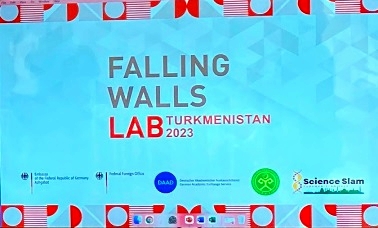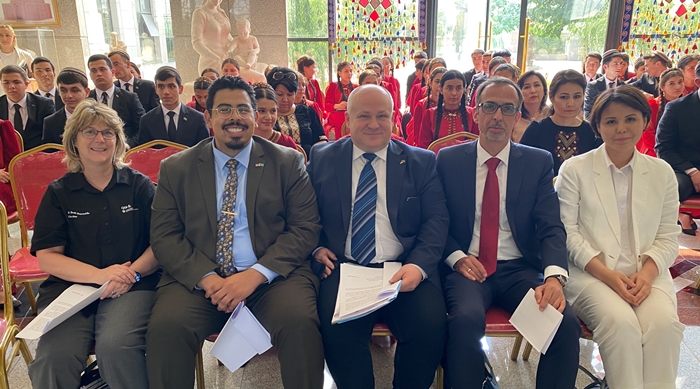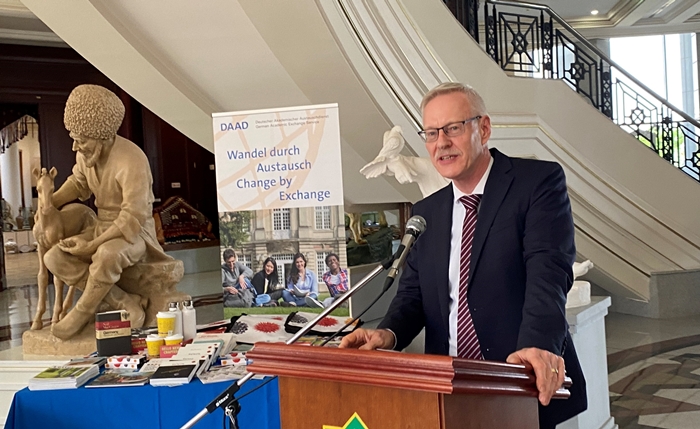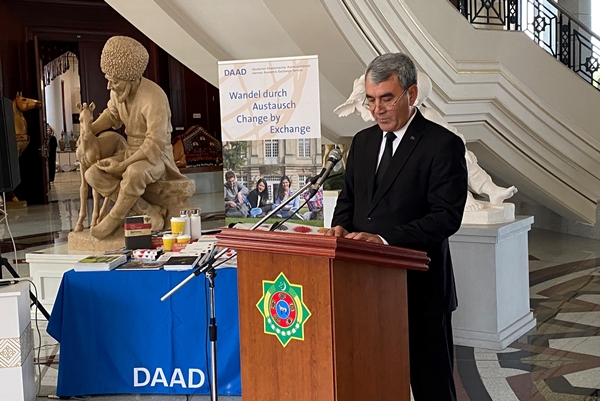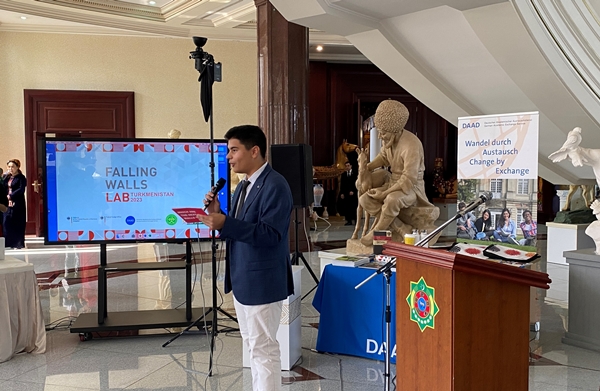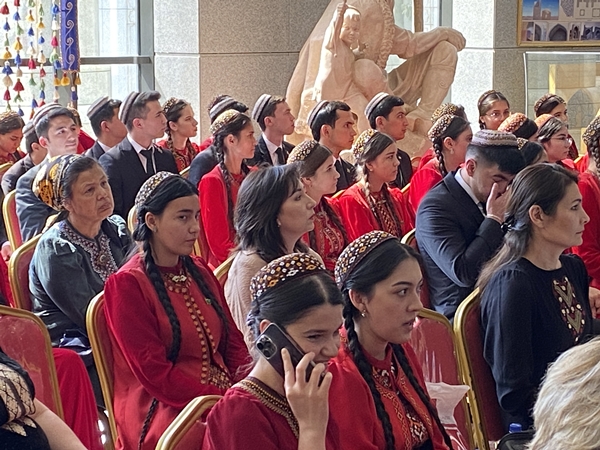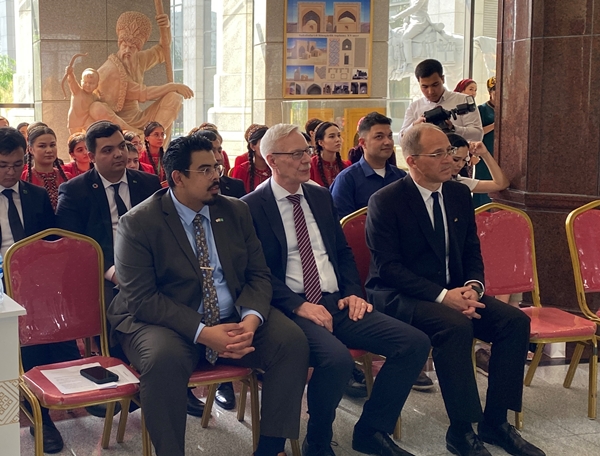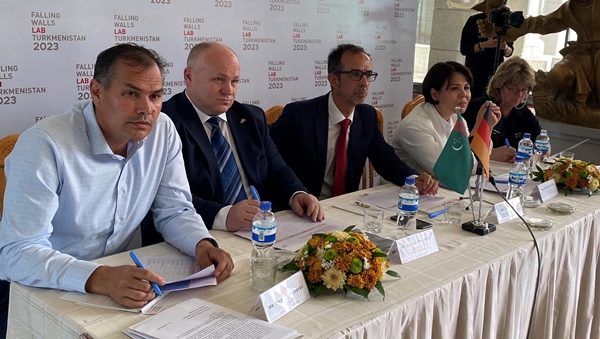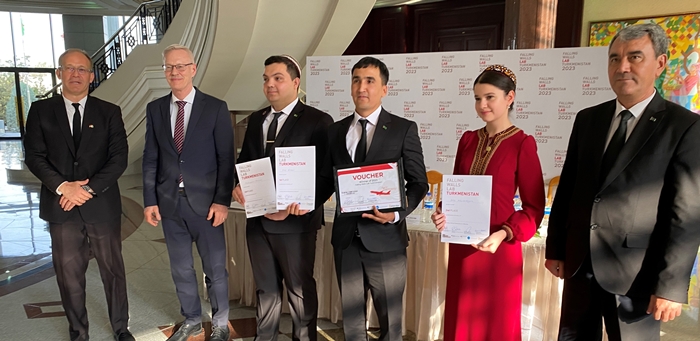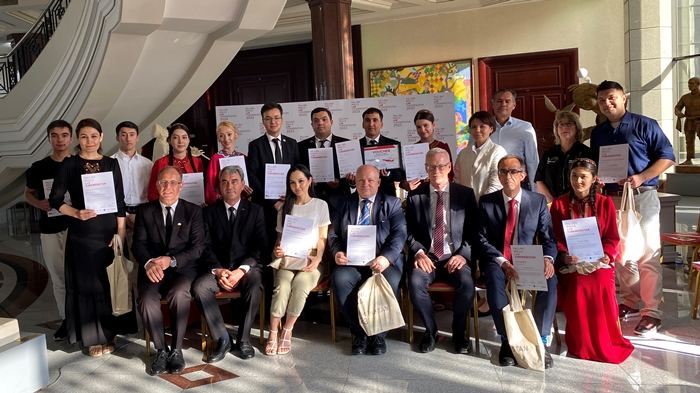nCa Report
There were twelve finalists, and all of them were well prepared. Their ideas were groundbreaking. The jury was definitely hard put to pick the winner.
As the late afternoon languorously merged into early evening, the entrance hall of the academy of fine arts of Ashgabat turned into a cozy little corner for exchange of innovative and pioneering concepts on 11 May 2023.
First, a few words about this pioneering concept of Falling Walls Lab.
It is based on the fall of the Berlin wall on 9 November 1989, which transformed (and continues to transform) the lives of millions of people.
The driving message is that there are walls everywhere that must fall.
Falling Walls Lab is organised by the Falling Walls Foundation and funded by the Museum für Naturkunde (global finale), and Google and Springer Nature (international Labs). It is supported by Sartorius, the Federal Foreign Office of Germany, and the German Academic Exchange Service (DAAD).
The Falling Walls Foundation is a non-profit organisation in Berlin, dedicated to supporting science and the humanities. It is a unique international platform for leaders from the worlds of science, business and politics, the arts, and society. Falling Walls fosters discussion on research and innovation, and promotes the latest scientific findings among a broad audience from all parts of society.
Each year, renowned academic institutions around the world organise their own Falling Walls Labs to showcase the quality, diversity, and passion of their region’s most innovative minds. In three minutes each, participants try to convince a high-calibre jury of their solutions to some of the most pressing challenges of our time.
The breakthrough factor and potential impact of the presented work help determine the winner, who qualifies for the global Finale in Berlin on 7 November and wins a ticket to attend the Falling Walls Science Summit, where they get to interact with the world’s movers and shakers of science, business, and policymaking.
During their multi-day stay in Berlin, the international Lab winners take part in a broad extended programme that includes a coaching session, expert workshops on a broad range of topics such as career development, entrepreneurial skills, and academic publishing, and events hosted by prestigious German research organisations such as the German Research Foundation (DFG). At the global finale, the international Lab winners compete to become the Breakthrough Winner in the Emerging Talents category of Falling Walls, taking home the title and prize money, and receiving the opportunity to pitch their idea once again on the Falling Walls Breakthroughs of the Year stage, which, throughout the day, hosts leading experts, changemakers, and luminaries, including
Nobel laureates and Leibniz Prize winners.
Falling Walls Lab is a world-class pitch competition, networking forum, and steppingstone that brings together a diverse and interdisciplinary pool of students and early-career professionals by providing a stage for breakthrough ideas both globally and locally.
Each contestant gets three minutes to pitch their idea, with the help of no more than four slides.
The jury decides the winners.
The event on 11 May 2023 was the first Falling Walls Lab competition in Ashgabat. It was organized by the German Academic Exchange Service in Turkmenistan with the support of the Embassy of the Federal Republic of Germany and the Ministry of Education of Turkmenistan.
It was anchored by Shukurgeldi Myradov, Coordinator of Young SDG Ambassadors endorsed by UN Turkmenistan.
After brief remarks by Michael U. Bierhoff, the ambassador of Germany in Turkmenistan, and Dr. Raymond Selke, Lecturer of the DAAD (German Academic Exchange Service) at the Azadi Institute, the contestants made their pitch.
There was not a dull moment in this trailblazing event.
Here is the list of contestants and the walls they want to fall:
| Contestant | Breaking the Wall of |
| Meryem Durdymammedova, student at the State Academy of Art | Prevalence of Forgeries |
| Yusup Agajanov, Assistant PE Teacher at Ashgabat International School | Uncertainty |
| Ayhan Meredov, Student at TITKUKI Ashgabat | Car Overheating |
| Selbi Ashirberdyyeva, Student at Medical University named after Murat Garriyev, Ashgabat | Chronic Post-burn wounds |
| Arslankerim Kerimov, Student at Institute of International relations of the Ministry of Foreign Affairs of Turkmenistan, Ashgabat | Via CA Multimodal Corridor |
| Eziz Artykov, Teacher of Biology and Ecology at Turkmen State Pedagogical Institute, Turkmenabat | Resource Scarcity |
| Muhammetaly Agamedov, PhD Candidate at at Medical University named after Murat Garriyev, Ashgabat | Immune System Activation |
| Shabibi Nurlyyeva, Student at International University for the Humanities and Development, Ashgabat | Development Delay |
| Vekilmuhammet Bekmyradov, Student at Oguzhan Engineering and Technology University of Turkmenistan, Ashgabat | Energy Waste |
| Akjagul Atamuradova, Technical Interpreter at PETRONAS Carigali (Turkmenistan) Sdn Bhd | Technical Interpreting |
| Tylla Rejepova, Seda ES Application&Product Specialist, Ashgabat | Antibiotic Stewardship |
| Merjen Jumageldiyeva, “Innowasiýa Tilsimaty” private enterprise, Web Developer | Mathematics |
And, the Jury
- Dirk Jakobi, deputy head of mission, German Embassy, Ashgabat
- Alexander Liehr, Branch Director, Commerzbank, Ashgabat
- Ayna Seyitliyeva, Head of Office, UNFPA, Ashgabat
- Jodi Burnside, Director, Ashgabat International School
- Marat Jernayev, Branch Director, General Electric, Ashgabat
The winner of the competition, who will go to Berlin in November this year, was Eziz Artykov, Teacher of Biology and Ecology at Turkmen State Pedagogical Institute, Turkmenabat. Speaking on resource scarcity, he proposed a new variety of rice called Bereket. It can be sown late in the season and as such will require 40% less water. It takes about 120 days to mature and gives about 8 tons per hectares of yield. It is a timely idea, not just for Turkmenistan but for the world at large.
The second place went to Selbi Ashirberdyyeva, Student at Medical University named after Murat Garriyev, Ashgabat, who spoke about the treatment of chronic post-burn wounds. It is a praiseworthy notion because the chronic wounds are not just a drain on the physical health of the patient but they also impact the mental health and self-image.
Arslankerim Kerimov, Student at Institute of International relations of the Ministry of Foreign Affairs of Turkmenistan, Ashgabat, got the third place for his presentation on the movement of cargo between China and Europe through the Middle Corridor, in which Turkmenistan plays a key role. He pointed out that it will take the cargo less than nine days to move between China and Europe.
The winners were three and only one of them will go to Berlin but that does not diminish the important of all the other ideas voiced during the event. Each one is worthy of further exploration and serious follow-up. /// nCa, 12 May 2023
To be continued . . .
Here are some photos from the event:
